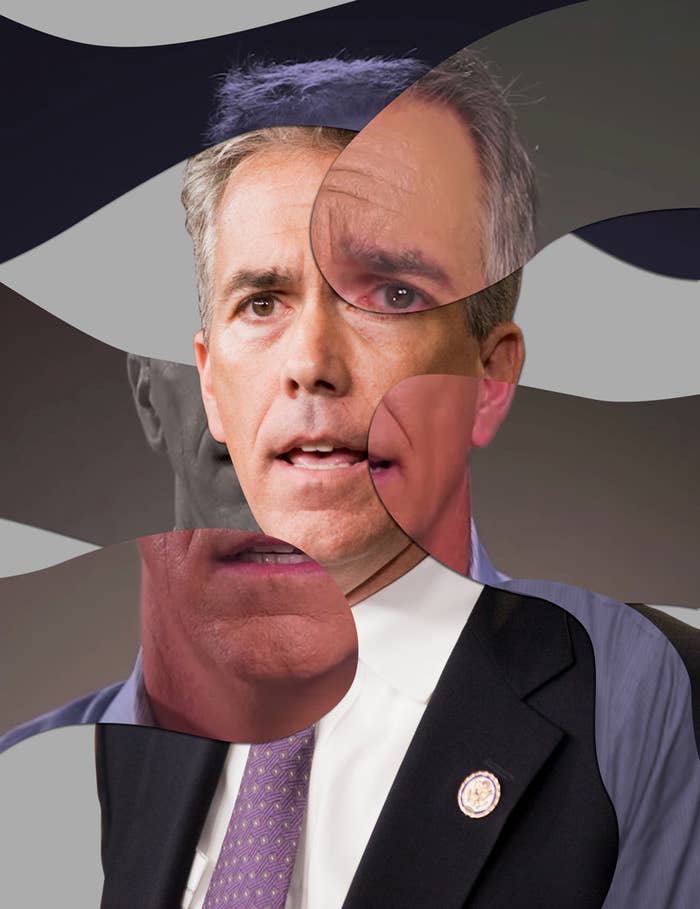
In May 2012, a group of do-gooder congressmen held a press conference to announce their new “Fix Congress Now” caucus.
The effort, two conservative Democrats and two moderate Republicans told us that day, would encourage civility among Democrats and Republicans and perhaps get them to work together for the good of the nation.
Also, Joe Walsh was there.
None of the other members of Congress seemed to know why: His name isn’t on a press release for the event, and my story from the day doesn’t even mention Walsh. The few reporters at the event laughed at the idea that Joe Walsh was hoping for a functional Congress, of civility and camaraderie.
This week, Walsh announced a long-shot primary bid against President Donald Trump and went on TV to apologize for saying incredibly incendiary and racist things in the not-so-distant past. Back when he was in Congress, Walsh made a big show of skipping one of Obama’s joint addresses and called the president “idiotic.” One of his former Republican colleagues described him to me as one of the most “vitriolic, partisan members of our conference.” Another said they had a hard time remembering what working with Walsh was like, because they could only recall that he was “a giant pain in the ass who liked to go on TV.” (Walsh told me in an interview that he wouldn’t normally respond to nameless comments but yes, generally, the “Republican Party didn’t like me, that’s fair to say.”) Dave Weigel once quoted Walsh as saying that Obama was elected because he was “a black man who was articulate, liberal, the whole white guilt, all of that” — and described Walsh as “the biggest media hound in the freshman class.”
So actually, it made perfect sense that Walsh was there at the “Fix Congress Now” caucus press conference: It was a few months before the 2012 election, and he was about to lose. He wanted the press! And he knew that seeming like a genteel “problem solver” was one way to get it.
He’s always been a creature of whatever moment he happens to be in, and he tends to do and say whatever he thinks might get him the most airtime. Back then, in the early 2010s, he’d ridden the Tea Party movement to Washington. And he was the perfect avatar of that time: a guy who went far to the right to win a primary, defeated a moderate Democrat in suburban Illinois by 291 votes, yelled a lot in Congress, and promptly became a conservative radio host after losing reelection. That’s the one true navigating principle of Walsh’s career: He loves attention.
“I came here figuratively to scream from the mountaintop,” he told Chicago Sun-Times columnist Lynn Sweet in 2011.
Walsh now barely remembers that he was ever in the “Fix Congress Now” caucus (I had to jog his memory on the details). He said that he attended two or three meetings because he “liked the idea of it,” then got very busy “running for my life for reelection.”
And for those of us who covered Walsh in Washington, Walsh’s post-congressional career turn from arguing he should be able to say the n-word to condemning Trump for incivility and earning supporters in the Never Trump world is hardly a surprise. While he once voted for Trump and proclaimed he’d be “grabbing my musket” if Trump were to lose, he now says that he believes he helped create Trump and that he’s really sorry for all the bad stuff he’s said, which, of course, wasn’t very long ago. (As of 2016, for instance, Walsh was still saying people only voted for Obama because he was black. Jerry Dunleavy at the Washington Examiner has the most comprehensive roundup of his particularly egregious remarks over the years. Walsh, for his part, says, “All I can do is apologize now.”)
Walsh denies that he’s changed his political positions at all or that he’s hungry for attention. He does admit that in Congress and in the years that followed, he engaged in what he calls “ugly personal politics.”
“When I was in Congress and before Trump, there’s no doubt that I engaged in — more than I’m comfortable with now — ugly personal politics, the demonization of Obama and my political opponents. As I look back on that stuff now, it does pain me,” he said in an interview. “When I’ve looked at Trump these last few years, I see, like, the worst version of Joe Walsh, and it’s forced me to go ‘wow’ and do some soul-searching.”
He also denies that he’s a “media hound.” He was asked to go on TV, he contends, because he was “outspoken” — and then people kept asking him to go on TV. Here again, though, Walsh sees how he’s similar to Trump.
“The one thing Trump and I share, he clearly doesn’t speak like a normal politician, and I don’t, either,” he said.
Walsh doesn’t exist in isolation, after all. People do ask him to go on TV. His tweets before and after did get attention. A handful of notable Republicans are supporting his presidential bid. His career is often useful to someone. And these days, Walsh’s Trump criticism is useful to the Republicans who don’t want Trump reelected.
Bill Kristol, the longtime political operative, and Republican lawyer George Conway, two of the most vocal Republican Trump critics, particularly on matters of discourse and norms, have been supportive of Walsh’s presidential bid. (Neither responded to a request for comment, but Kristol told the New York Times, “The fact that he was a Tea Party congressman who voted for Trump in 2016 gives him an ability to speak to Republican primary voters that ‘Never Trumpers’ like me don’t have.”)
Walsh’s fellow Trump challengers, meanwhile, don’t seem particularly concerned with Walsh’s distant or recent past.
“Just generally, the more the merrier is sort of my perspective,” said former South Carolina governor Mark Sanford, who’s considering his own anti-Trump primary. “I mean, you know, it’s one thing for Bill Weld to be doing it alone; it’s another thing...you know, when you get to, you know, three, four, five candidates, I think it becomes that much harder for the president to pretend that there isn’t a primary process and to pretend that we don’t need to have a debate.
“I happen to think a spirited debate within the Republican Party on what it means to be a Republican would be a good thing,” he added.
Weld, the former Massachusetts governor who is already challenging Trump, likewise didn’t have any thoughts on Walsh in particular.
“Gov. Weld is focused on Donald Trump's record, not Mr. Walsh's,” said Weld spokesperson Joe Hunter. But, he added, “having two or more candidates challenging him, it will be difficult for Trump, the RNC, and the media to deny primary voters the opportunity to see the president defend his behavior and record on a debate stage.”
And so once again, Joe Walsh has become what he’s best at: being an avatar, and a creature of the moment — though he and you might see this moment’s opportunity differently.
“This is the biggest, most difficult thing I’ve ever done. It is a pain in the ass; it’s like I’m in a boxing ring,” he said. “I’ve been in it for two days and it feels like two years. There’s no way I would do this unless I wanted to win. If I wanted to get attention and be popular, I’d still be on talk radio and singing Trump’s praises.”
Rosie Gray contributed to reporting.
CORRECTION
Jerry Dunleavy's name was misspelled in an earlier version of this post.

